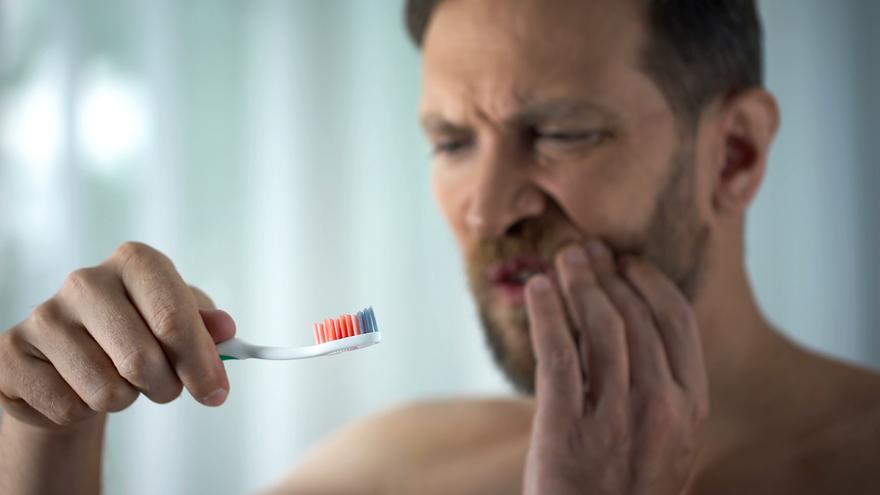How Sugar Fuels Gum Disease

The link between sugar and cavities is well known. Cavities are largely caused by enamel-eating bacteria in the mouth which feeds on sugar. (1)
Dental Surgeon Dr. Steven Sedaros says a different species of bacteria (that also feeds on sugar) can cause gum disease. (2) He explains, sodas and juices can be especially dangerous to our oral health because:
“Liquid forms of sugar are able to get in every opening and crevice in your mouth. Even if your brush your teeth twice a day and loss regularly, reaching all of the places where the bacteria can reside after consuming one of these drinks is difficult.” (2)
In addition to sugary drinks, Dr. Sedaros cautions us against starchy foods (such as bread, pasta, and chips) because they convert to sugar soon after chewing and are sticky. They can wedge into hard-to-reach crevices and can contribute to dental decay and gum inflammation. He recommends brushing and flossing after every meal and snack, and drinking lots of water to flush bacteria from the teeth.
Approximately 41 million Americans wear dentures. Millions more have their teeth drilled, pulled, filled, and undergo root canals every year.
If the pain and expense of decaying teeth and gums are not bad enough… it gets worse.
“It’s easy for some people to see dental or oral problems as a completely separate thing from other illness or disease, but that’s not how the body works.” (3)
It turns out the pathogenic bacteria that cause teeth and gum issues, can emit toxins that can travel from our mouth to our brain and other parts of the body.
A 2019 study published in the journal Science Advances shows rogue oral bacteria are linked to arthritis, Alzheimer’s, and pneumonia (4). Other studies link oral bacteria to heart disease. The studies do not show causation but rather a correlation which should come as no surprise given the fact sugar consumption is directly linked to these medical conditions. Sugar consumption is the common denominator.
Interestingly, we have over 700 different species of bacteria in our mouths. Most support our health, about two dozen do not.
Bacteria that love sugar fall into a health-harming category. These bacteria not only damage oral health, but they can also enter the bloodstream through inflamed gums and oral infections and impact other organs. Double bad.
If you are currently dealing with oral health issues, there is good news. The ratio of friendly to pathogenic bacteria can be rebalanced in the mouth and oral health issues can be improved.
A study published in The Journal of the American Geriatric Society (2012), showed that 625 men eating high-fiber foods, such as fruits and vegetables, arrested the progression of periodontal disease. Fiber supports the production of saliva that can offset the acids created by bad bacteria and can clean teeth. (5)
The bottom line?
A low-sugar diet will starve out ‘bad’ bacteria and bring them back to manageable levels. It can prevent cavities and reverse periodontal disease.
A high-sugar diet will facilitate the proliferation of about 24 species of oral ‘bad’ bacteria that not only rot our teeth, but also inflame our gums, and contribute to infection and inflammation, it ruptures the natural seal between our gums and bloodstream. Gum disease creates a portal for unfriendly oral bacteria to travel to other parts of the body and wreak havoc there too.
If you want to keep your winning smile well into your senior years, start now.
If you want to keep your teeth and avoid the expense and nuisance of dentures, ditch the white devils (sugar and flour), and optimize your oral care routine. Don’t wait until it is too late.
— Florence, The Kick Sugar Coach
Sources:
(1) https://www.mayoclinic.org/diseases-conditions/cavities/symptoms-causes/syc-20352892
(2) https://www.sedarosoralsurgery.com/blog/sugar-fuels-gum-disease/
(4) https://www.science.org/doi/10.1126/sciadv.aau3333
https://www.sciencedaily.com/releases/2019/01/190123165002.htm
Stay Connected.
Be the first to hear about new courses, workshops, podcast interviews,
and free resources created to help you find and sustain food recovery.
Stay Connected.
Be the first to hear about new courses, workshops, podcast interviews,
and free resources created to help you find and sustain food recovery.
Stay Connected.
Be the first to hear about new courses, workshops, podcast interviews, and free resources created to help you find and sustain food recovery.
0 comments
Leave a comment